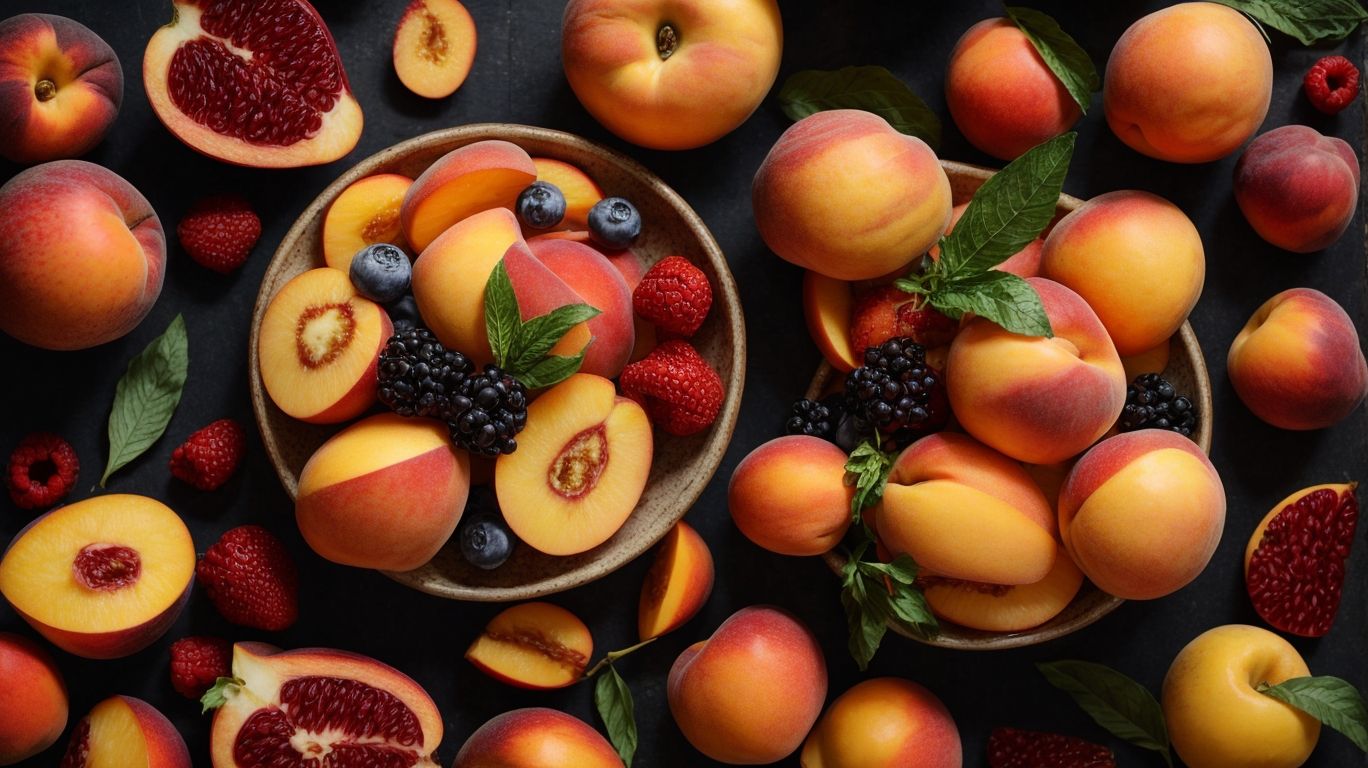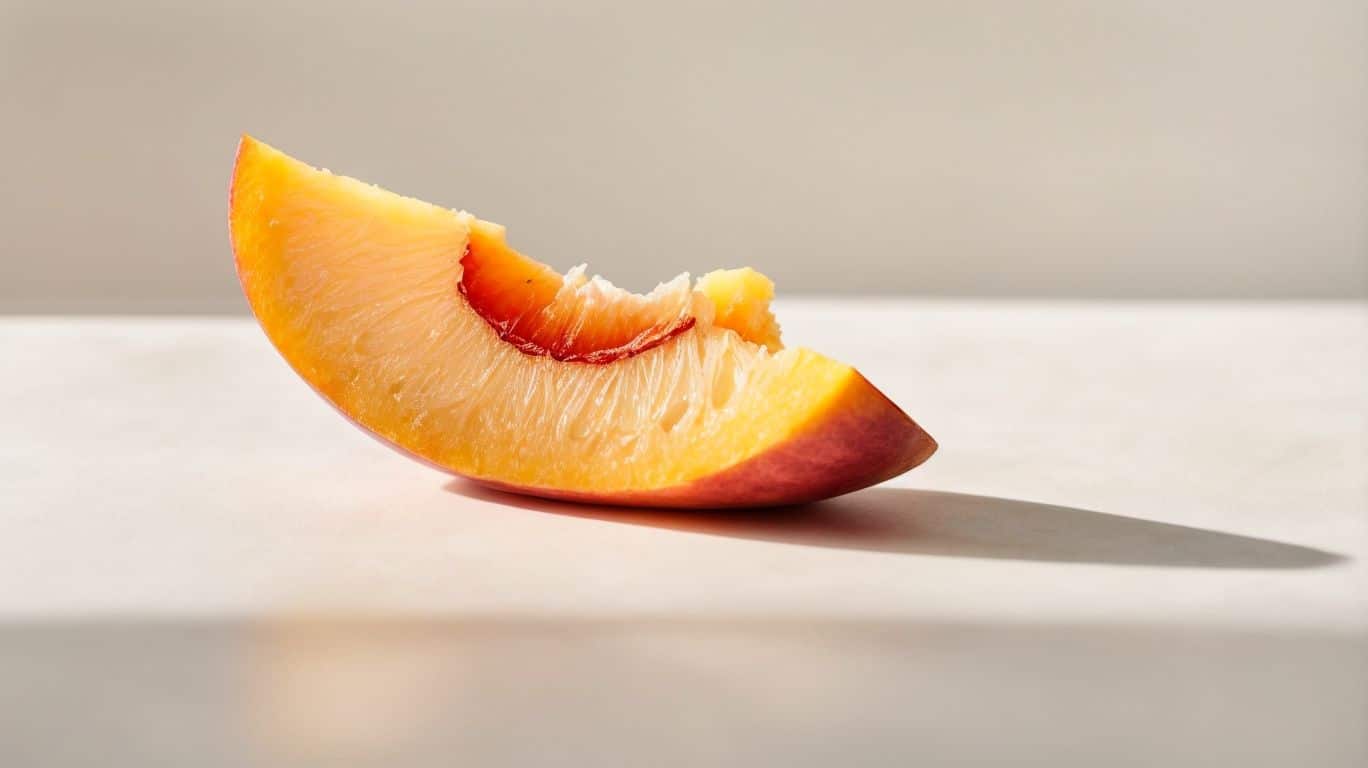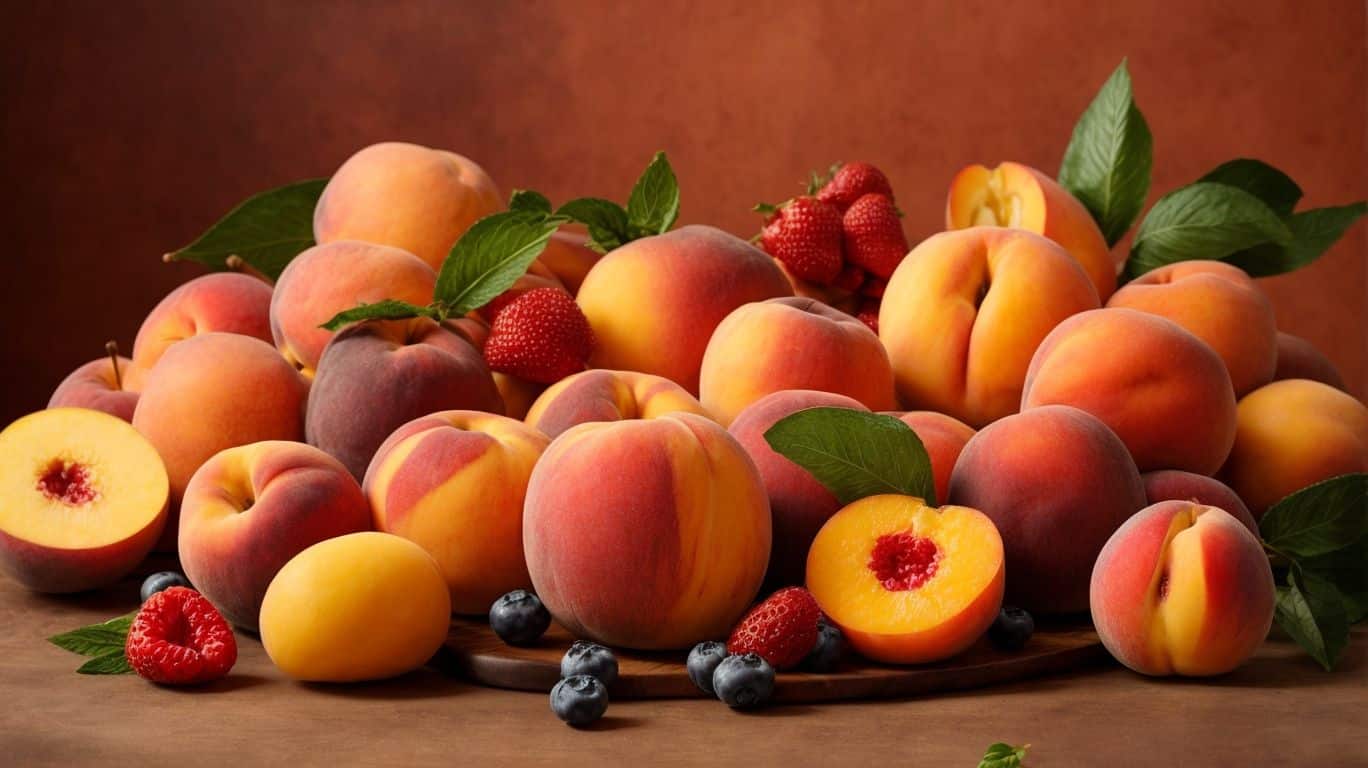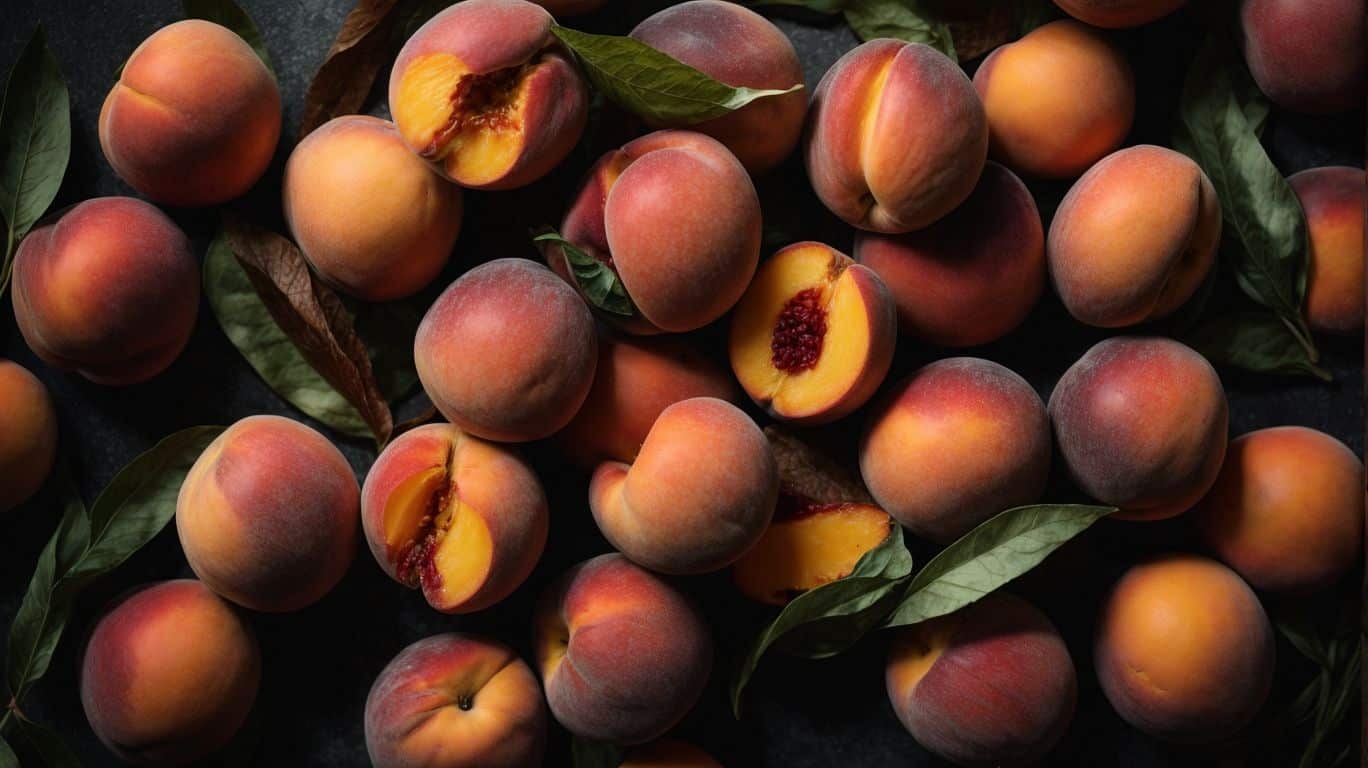The ketogenic diet has gained popularity for its ability to promote weight loss and improve overall health. When following a keto diet, it is essential to choose foods that are low in carbohydrates and high in healthy fats. When it comes to fruits, not all are suitable for a keto diet. In this article, we will explore whether peaches, a sweet and juicy fruit, can be considered keto-friendly. To understand what makes a food keto-friendly, we need to consider its carbohydrate content and glycemic index. Next, we will examine the specific carbohydrate and sugar content of peaches and their impact on ketosis. Finally, we will discover other low-carb fruits that can be enjoyed on a keto diet and explore some delicious keto-friendly recipes incorporating these fruits.
What Does It Mean for a Food to Be “Keto-Friendly”?

Photo Credits: Ieatketo.Com by Jordan Miller
When it comes to determining if a food is “keto-friendly,” there are a few key factors to consider. In this section, we’ll explore what it really means for a food to be keto-friendly and how it aligns with your low-carb goals. Dive into understanding carbohydrate content and discover the importance of considering glycemic index. Get ready to make informed choices and delve deeper into the world of low-carb fruits like peaches. Let’s get started on our keto-friendly journey!
Understanding Carbohydrate Content
Understanding the carbohydrate content of food is crucial when following a keto diet. Here’s a table showcasing the carbohydrate content in common food items:
| Food Item | Carbohydrate Content (per 100g) |
|---|---|
| Peaches | 9g |
| Strawberries | 8g |
| Blueberries | 14g |
| Raspberries | 12g |
| Avocado | 2g |
| Tomatoes | 3.9g |
| Watermelon | 7.6g |
| Apples | 14g |
| Oranges | 11g |
Understanding the carbohydrate content in these foods will help you make informed decisions while following a keto diet. It’s important to choose low-carb options like avocados and berries, while being mindful of portion sizes.
Considering Glycemic Index
The glycemic index is an important factor to consider when following a keto diet. Considering Glycemic Index, it measures how quickly a food raises blood sugar levels. Foods with a high glycemic index can cause spikes in blood sugar, which can hinder ketosis. When choosing keto-friendly foods, opt for those with a low glycemic index to ensure stable blood sugar levels. Some examples of low-glycemic index foods include non-starchy vegetables, berries, avocados, and nuts. By considering the glycemic index, you can make informed choices that align with your keto diet goals.
Are Peaches Keto?

Photo Credits: Ieatketo.Com by Jonathan Garcia
Are peaches keto? Let’s dive into the carbohydrate and sugar content of peaches, their impact on ketosis, and the importance of portion control and moderation. We’ll uncover the facts backed by reliable sources to help you make informed decisions about including peaches in your low-carb diet. So, if you’ve been wondering whether peaches fit into your keto lifestyle, this section has all the answers you need!
Examining the Carbohydrate and Sugar Content in Peaches
When analyzing the carbohydrate and sugar content in peaches, it is crucial to examine the portion size and its overall impact on ketosis. Taking a closer look, one medium-sized peach contains approximately 13 grams of carbohydrates and 10 grams of sugar. Although peaches may not possess the lowest carbohydrate content compared to some other fruits, they can still be consumed in moderation while following a keto diet. It is vital to practice portion control and include peaches as part of a well-balanced meal plan. Moreover, incorporating other low-carb fruits like berries, avocado, tomatoes, and apples can offer additional variety and nutritional advantages when adhering to a keto lifestyle.
The Impact of Peaches on Ketosis
The impact of peaches on ketosis can vary depending on certain factors. Here are a few key points to consider:
- The Impact of Peaches on Ketosis – Peaches contain natural sugars and carbohydrates, which can affect ketosis. One medium-sized peach typically contains around 13 grams of net carbs.
- Portion control and moderation: Enjoying peaches in small portions and incorporating them into your overall daily carbohydrate allowance can help maintain ketosis.
- Individual tolerance: Some people may be more sensitive to the impact of carbohydrates on ketosis, while others may have more flexibility.
It’s important to listen to your body and monitor your ketone levels to determine the impact of peaches or any other food on your specific ketogenic journey.
Portion Control and Moderation
In the context of a keto diet, the key to maintaining ketosis and achieving desired results lies in practicing portion control and moderation.
- To ensure that your ketosis is not impacted, it is important to avoid overconsumption of low-carb fruits like peaches which still contain carbohydrates.
- For better control, keep track of your fruit intake and limit it to smaller portions that fit within your daily carbohydrate limit.
- Incorporate other low-carb fruits such as berries, avocado, and tomatoes into your diet as they provide a good nutritional balance.
- Always be mindful of the overall balance of your meals and snacks, making sure they align with the principles of the keto diet.
By practicing portion control and moderation, you can enjoy the benefits of low-carb fruits while staying on track with your keto goals.
Discovering Other Low-Carb Fruits

Photo Credits: Ieatketo.Com by John King
Unveiling a treasure trove of low-carb fruits, this section takes you on a journey to discover a diverse array of options. From the vibrant berries bursting with antioxidants to the creamy goodness of avocado and the juicy delight of tomatoes, we’ll explore an assortment of fruits that can complement a keto lifestyle. With strawberries, blueberries, raspberries, apples, oranges, and more in our basket, get ready to savor the flavors while keeping your carb count in check.
Berries: Strawberries, Blueberries, Raspberries
Berries, including strawberries, blueberries, and raspberries, are excellent options for those following a keto diet due to their low carbohydrate content. These fruits are rich in vitamins, minerals, and antioxidants, making them a healthy choice.
| Strawberries | With only 8 grams of net carbs per cup, strawberries are a delicious and keto-friendly fruit. |
|---|---|
| Blueberries | Although slightly higher in carbs, blueberries can still be enjoyed in moderation, with around 9 grams of net carbs per cup. |
| Raspberries | Raspberries are among the lowest in carbs, with only about 6 grams of net carbs per cup. |
Including these berries in your keto meal plan adds a burst of flavor and natural sweetness while keeping your carbohydrate intake in check. They can be enjoyed fresh, as toppings for yogurt or salads, or even incorporated into keto-friendly desserts.
Avocado
Avocado is a versatile and nutritious fruit that is commonly consumed on the keto diet due to its low carbohydrate content. It is rich in healthy fats, fiber, and vitamins like vitamin K, vitamin C, and vitamin E.
Here is a breakdown of the nutritional content of avocado per 100 grams:
| Calories | Carbohydrates | Fiber | Fat | Protein |
|---|---|---|---|---|
| 160 | 8.5 grams | 6.7 grams | 14.7 grams | 2 grams |
Avocado can be enjoyed in various ways on the keto diet, such as in salads, as a topping for meat or fish, or as a main ingredient in guacamole. It provides a creamy texture and adds a delicious flavor to meals.
Incorporate avocado into your keto meal plan to boost your healthy fat intake and add variety to your diet. Remember to practice portion control, as avocado is still relatively high in calories. Enjoy this keto-friendly fruit as part of a well-balanced and nutritious diet.
Tomatoes
Tomatoes are a versatile and keto-friendly fruit that can be enjoyed in various ways. They are low in carbs, with about 4 grams of net carbs per 100 grams. Tomatoes are also rich in vitamins, minerals, and antioxidants, making them a nutritious choice for a ketogenic diet. Whether eaten raw in salads, cooked in sauces, or roasted as a side dish, tomatoes add flavor and texture to meals without adding excessive carbs. Fun fact: Tomatoes are botanically classified as fruits but are often treated and used as vegetables in culinary applications.
Watermelon
| Watermelon | |
| Description | Watermelon is a juicy, refreshing fruit known for its high water content and sweet taste. |
| Carbohydrate Content | Watermelon is relatively low in carbohydrates, with about 7.6 grams of carbs per 100 grams. |
| Impact on Ketosis | While watermelon does contain some carbs, it can still be included in a keto diet if consumed in moderation and accounted for in daily carb intake. |
| Nutritional Value | Watermelon is a good source of vitamins A and C, as well as hydration due to its high water content. |
| Serving Suggestions | Watermelon can be enjoyed on its own, added to salads, or blended into smoothies for a refreshing keto-friendly treat. |
Apples
Are Apples a common fruit enjoyed by many, but are they keto-friendly? Let’s take a closer look:
| Nutrition Content | Per 100g |
| Carbohydrates | 14g |
| Fiber | 2.4g |
| Sugar | 10g |
While Apples do contain some carbohydrates and sugar, they also provide fiber and various vitamins. When following a keto diet, it’s important to monitor your carbohydrate intake, so including Apples in moderation may be possible. It’s crucial to consider your overall daily carbohydrate limit and balance it with other low-carb foods. Consulting with a healthcare professional or nutritionist can provide personalized guidance for incorporating Apples into a keto diet.
Oranges
Oranges are a popular fruit that may be enjoyed on a ketogenic diet due to their low carbohydrate content.
They contain approximately 11 grams of net carbs per 100 grams, making them a suitable choice for those following a low-carb eating plan.
Oranges also provide essential nutrients such as vitamin C, folate, and potassium.
They can be included in a keto-friendly diet in moderation, ensuring that daily carbohydrate intake is within the desired range.
It’s important to note that portion control is key when consuming oranges on a ketogenic diet to maintain ketosis and achieve desired results.
Keto-Friendly Recipes Using Low-Carb Fruits

Photo Credits: Ieatketo.Com by Robert Rodriguez
There are many delicious and keto-friendly recipes using low-carb fruits. Here is a table showcasing some popular options:
| Recipe | Main Ingredients | Net Carbs per Serving |
| Strawberry Avocado Salad | Strawberries, Avocado, Spinach | 4g |
| Blueberry Chia Pudding | Blueberries, Chia Seeds, Almond Milk | 5g |
| Watermelon Feta Salad | Watermelon, Feta Cheese, Mint | 8g |
| Raspberry Coconut Smoothie | Raspberries, Coconut Milk, Greek Yogurt | 6g |
These keto-friendly recipes using low-carb fruits are not only delicious but also fit well within a keto diet, as they contain low-carb fruits that won’t spike your blood sugar levels. Enjoy these keto-friendly treats while still keeping your carb intake in check!
Some Facts About “Are Peaches Keto? Discovering Low-Carb Fruits”:
- ✅ Peaches are not considered keto-friendly due to their high carb content. (Source: wholesomeyum.com)
- ✅ Canned peaches, even those without added sugar, are also not suitable for a keto diet. (Source: wholesomeyum.com)
- ✅ Peach cobbler is not keto-friendly due to its high carb content. (Source: wholesomeyum.com)
- ✅ One whole peach contains 15.2 grams of total carbs and 13 grams of net carbs. (Source: wholesomeyum.com)
- ✅ There are several keto-friendly substitutes for peaches such as peach extract, peach jam, peach water enhancer, peach gelatin, peach protein shakes, and peach tea. (Source: wholesomeyum.com)
Frequently Asked Questions
Are peaches keto-friendly?
Yes, peaches are not considered keto-friendly due to their high carb content. One whole peach contains 15.2 grams of total carbs and 13 grams of net carbs, which may exceed the carb limit allowed on a keto diet.
What are the alternatives to peaches on a keto diet?
If you’re on a keto diet but still crave peach flavor, there are several alternatives you can try. These include peach extract, peach jam, peach water enhancer, peach gelatin, peach protein shakes, and peach tea. These substitutes allow you to enjoy the peach flavor while keeping your carb intake minimal.
Can I eat canned peaches on a keto diet?
Canned peaches, even those without added sugar, are not keto friendly. One cup of sliced canned peaches contains 14.9 grams of total carbs and 11.7 grams of net carbs. The high carb content makes it unsuitable for a keto diet.
Which fruits are suitable for a low-carb or ketogenic diet?
While peaches may not be suitable for a low-carb or ketogenic diet, there are several other fruits that you can include. Some low-carb fruits include strawberries, oranges, avocados, watermelon, and tomatoes. These fruits have lower net carb amounts and provide health-promoting nutrients and antioxidants.
What are the benefits of including fruit in a low-carb diet?
Including fruit in a low-carb diet can be beneficial as fruits provide health-promoting nutrients and antioxidants. They also contribute dietary fiber, which can aid in digestion and help maintain a healthy weight. It’s important to choose fruits with the lowest amount of carbs to meet your weight loss goals on a low-carb diet.
How does the keto diet work?
The keto diet is a low-carb, high-fat eating plan that restricts carb intake to less than 20-50 grams per day. By reducing the intake of carbs, the body enters a state of ketosis, where it burns fat for energy instead of carbohydrates. This can result in weight loss and improved health markers, such as blood sugar control and reduced risk of chronic diseases.


